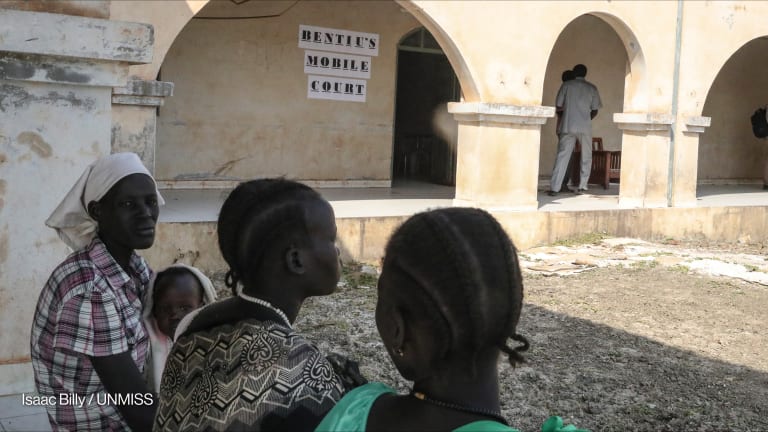Opinion: USAID's pivot to people-centered justice is a game changer
Rather than reinforcing justice institutions to which people do not turn, development assistance must focus on understanding people’s justice needs and transforming institutions and services to meet those needs. USAID's new approach may get there.
Amid the many lofty and abstract speeches of the recent second Summit for Democracy came one very positive development: The announcement by USAID of a new approach to advancing the rule of law, which if implemented effectively could demonstrate that “Democracy can deliver.” Characterized by the U.S. Agency for International Development as a “paradigm shift,” its new rule of law policy turns traditional assistance to justice institutions on its head, embracing a people-centered approach that prioritizes meeting people’s needs over those of justice ministries, courts, and bar associations. This new approach represents an innovation that can help counter years of steady decline in the rule of law globally. The rule of law means everyone is accountable under the law, regardless of position or power, and it promises equal, impartial justice for all. Most international efforts to promote the rule of law emphasize just the first half of this equation, and U.S. development assistance is no exception. The vast majority of the roughly $500 million in annual U.S. rule of law assistance supports strengthening justice institutions with new facilities, technology, and training. According to a recent Government Accountability Office study of USAID and State Department rule of law assistance, just 5% of 2018 rule of law assistance went to advancing “fairness and access to justice.” Research on people’s unmet justice needs suggests this allocation of resources has been missing the mark. An estimated 5.1 billion people globally have unmet justice needs. --— Surveys of people in 101 countries published by the World Justice Project in 2019 revealed that almost half had experienced a serious justice problem in the past two years, but the vast majority did not turn to formal justice institutions to solve them. Problems relating to housing, employment, debt, and family disputes often go unresolved, and nearly 30% reported that such problems caused them physical or stress-related illness, while 23% said they had to move or change jobs as a result. Obstacles to seeking justice abound, but the most prevalent explanation across the globe is people’s lack of awareness that their problems are legal. Many people do not seek justice because they do not know that the justice system affords them rights and solutions, while others face insurmountable challenges accessing or affording justice services. These findings have profound implications for justice sector development assistance and for democratic resilience. Rather than reinforcing institutions to which people do not turn, development assistance should focus on understanding people’s justice needs and transforming justice institutions and other services to meet those needs. This means a greater emphasis on providing information and education and reducing barriers to obtaining justice. Moreover, a people-centered approach prioritizes preventive measures that address the root causes of people’s problems, such as the lack of proof of legal identity or land tenure. These types of legal problems have cascading effects on people’s lives, ranging from employment and housing insecurity to violence and discrimination. Such experiences alienate people and make them vulnerable to populist authoritarianism. A people-centered approach that addresses these problems promises not only to alleviate suffering and foster opportunity but also to help build much-needed trust in institutions of government. USAID’s rule of law policy in practice As with any major policy change, making good on USAID’s new approach will require more than slapping a “people-centered justice” bumper sticker on its existing rule of law assistance portfolio. The new policy has all the right elements for success, but USAID’s program officers, contractors, and interagency partners will need to get on board with this new way of approaching justice system strengthening. Successful implementation will require prioritizing legal needs surveys and other data to identify people’s justice needs and the obstacles they face in meeting them. USAID should help justice institutions to make the most of such user data and encourage them to open their policymaking to citizen feedback and participation, democratizing justice institutions that are, in most countries, notoriously opaque and distant from the people they are intended to serve. A people-centered approach to justice also points to many preventive solutions that may be best pursued outside the justice sector. The new policy will require the integration of rule of law objectives into other forms of development assistance. Those working to improve justice outcomes will need to make common cause with those working on issues such as health, education, employment, agriculture, and housing to address the underlying justice problems that confound development assistance in these other areas. Such integration with the broader development assistance agenda has been a longtime, yet elusive, objective for U.S. democracy, rule of law, and human rights assistance. Success of the people-centered approach to justice will require that development groups finally get serious about breaking down silos between programs and pursue holistic programming that addresses the many justice issues at the root of development challenges. An estimated 5.1 billion people globally have unmet justice needs. Much remains to be done to put the new USAID rule of law policy into action, but its adoption represents an important step toward closing that daunting justice gap and achieving the Sustainable Development Goal of access to justice for all.
Amid the many lofty and abstract speeches of the recent second Summit for Democracy came one very positive development: The announcement by USAID of a new approach to advancing the rule of law, which if implemented effectively could demonstrate that “Democracy can deliver.”
Characterized by the U.S. Agency for International Development as a “paradigm shift,” its new rule of law policy turns traditional assistance to justice institutions on its head, embracing a people-centered approach that prioritizes meeting people’s needs over those of justice ministries, courts, and bar associations. This new approach represents an innovation that can help counter years of steady decline in the rule of law globally.
The rule of law means everyone is accountable under the law, regardless of position or power, and it promises equal, impartial justice for all. Most international efforts to promote the rule of law emphasize just the first half of this equation, and U.S. development assistance is no exception.
This article is free to read - just register or sign in
Access news, newsletters, events and more.
Join usSign inPrinting articles to share with others is a breach of our terms and conditions and copyright policy. Please use the sharing options on the left side of the article. Devex Pro members may share up to 10 articles per month using the Pro share tool ( ).
The views in this opinion piece do not necessarily reflect Devex's editorial views.
Elizabeth Andersen is the executive director of the World Justice Project, which works to promote the rule of law globally and annually publishes the WJP Rule of Law Index, measuring the rule of law in 140 countries.








